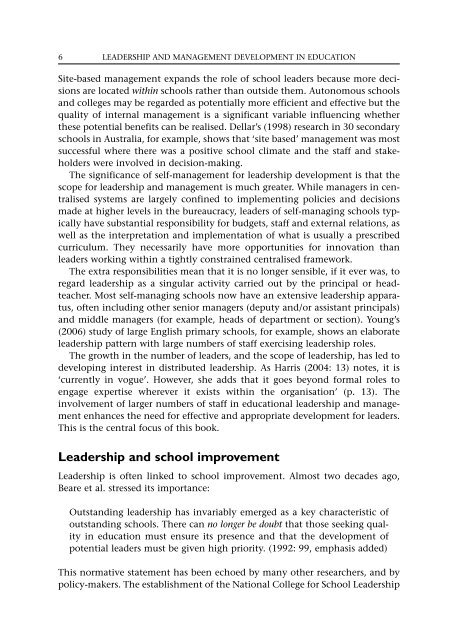Leadership and Management Development in Education (Education ...
Leadership and Management Development in Education (Education ...
Leadership and Management Development in Education (Education ...
You also want an ePaper? Increase the reach of your titles
YUMPU automatically turns print PDFs into web optimized ePapers that Google loves.
6LEADERSHIP AND MANAGEMENT DEVELOPMENT IN EDUCATIONSite-based management exp<strong>and</strong>s the role of school leaders because more decisionsare located with<strong>in</strong> schools rather than outside them. Autonomous schools<strong>and</strong> colleges may be regarded as potentially more efficient <strong>and</strong> effective but thequality of <strong>in</strong>ternal management is a significant variable <strong>in</strong>fluenc<strong>in</strong>g whetherthese potential benefits can be realised. Dellar’s (1998) research <strong>in</strong> 30 secondaryschools <strong>in</strong> Australia, for example, shows that ‘site based’ management was mostsuccessful where there was a positive school climate <strong>and</strong> the staff <strong>and</strong> stakeholderswere <strong>in</strong>volved <strong>in</strong> decision-mak<strong>in</strong>g.The significance of self-management for leadership development is that thescope for leadership <strong>and</strong> management is much greater. While managers <strong>in</strong> centralisedsystems are largely conf<strong>in</strong>ed to implement<strong>in</strong>g policies <strong>and</strong> decisionsmade at higher levels <strong>in</strong> the bureaucracy, leaders of self-manag<strong>in</strong>g schools typicallyhave substantial responsibility for budgets, staff <strong>and</strong> external relations, aswell as the <strong>in</strong>terpretation <strong>and</strong> implementation of what is usually a prescribedcurriculum. They necessarily have more opportunities for <strong>in</strong>novation thanleaders work<strong>in</strong>g with<strong>in</strong> a tightly constra<strong>in</strong>ed centralised framework.The extra responsibilities mean that it is no longer sensible, if it ever was, toregard leadership as a s<strong>in</strong>gular activity carried out by the pr<strong>in</strong>cipal or headteacher.Most self-manag<strong>in</strong>g schools now have an extensive leadership apparatus,often <strong>in</strong>clud<strong>in</strong>g other senior managers (deputy <strong>and</strong>/or assistant pr<strong>in</strong>cipals)<strong>and</strong> middle managers (for example, heads of department or section). Young’s(2006) study of large English primary schools, for example, shows an elaborateleadership pattern with large numbers of staff exercis<strong>in</strong>g leadership roles.The growth <strong>in</strong> the number of leaders, <strong>and</strong> the scope of leadership, has led todevelop<strong>in</strong>g <strong>in</strong>terest <strong>in</strong> distributed leadership. As Harris (2004: 13) notes, it is‘currently <strong>in</strong> vogue’. However, she adds that it goes beyond formal roles toengage expertise wherever it exists with<strong>in</strong> the organisation’ (p. 13). The<strong>in</strong>volvement of larger numbers of staff <strong>in</strong> educational leadership <strong>and</strong> managementenhances the need for effective <strong>and</strong> appropriate development for leaders.This is the central focus of this book.<strong>Leadership</strong> <strong>and</strong> school improvement<strong>Leadership</strong> is often l<strong>in</strong>ked to school improvement. Almost two decades ago,Beare et al. stressed its importance:Outst<strong>and</strong><strong>in</strong>g leadership has <strong>in</strong>variably emerged as a key characteristic ofoutst<strong>and</strong><strong>in</strong>g schools. There can no longer be doubt that those seek<strong>in</strong>g quality<strong>in</strong> education must ensure its presence <strong>and</strong> that the development ofpotential leaders must be given high priority. (1992: 99, emphasis added)This normative statement has been echoed by many other researchers, <strong>and</strong> bypolicy-makers. The establishment of the National College for School <strong>Leadership</strong>
















